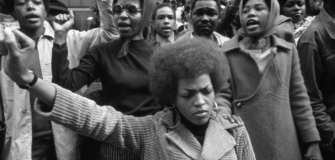Learning and Unlearning Toxic Habits in Intimate Relationships
Share
I was around six years old when I learned writing would become a form of expression and emotional outlet for me. I didn’t write fairytales. There were no dragons, princesses, or faraway lands that came to life in my notebook. Writing for me became a release; an escape from the emotional turmoil happening around me. I wrote about love and heartache. I wrote songs about relationships for my cousins to perform in my grandmother’s living room. I cried as I captured the emotions, feeling deeply connected to each word on my paper as if I, myself, was experiencing the pain of loving.
I grew up in a two-parent home, but I spent much of my adolescent and teen years wishing I didn’t. My parents shared an emotionally volatile, co-dependent relationship that, in between volatile moments, there was affection as a reassuring, “I love you”. My dad was often emotionally unavailable and my mom’s desperation for us to have a Cosby-like home environment was met with resentment. None of this is to say I grew up in a terrible environment. I went on family vacations every year, my home was well-kept, and I joined a variety of activities and had lots of friends. I did not want for any material thing, not even on my Christmas list.
The home I grew up in was emotionally sick. Fighting and making up from fights was the norm. I silenced myself often, bottling up my anger towards my mother’s passiveness and my father’s dismissiveness. As a child, I stayed in a child’s place, but this is where writing came in. It was as though my mom in all her distress, was fighting for love and my dad was rejecting it and I was mad at them both. I didn’t believe either of them could teach me a thing. I grew to hate when they shared a kiss or a touch because I did not believe it was true. Other relationships I witnessed were not any better. I knew women who stayed with abusers and women who swore off men; dominant women who at some point learned to need a man for nothing, but also craved the intimacy they never had. I didn’t know a Black woman who wasn’t learning to love herself while trying to teach me to as well.
Now, I am a 29-year-old woman and I’m right in the thick of unlearning toxic behaviors that give the illusion of love in a relationship. I’ve sacrificed my sense of self over and over to gain a man’s understanding and validation for my emotional security. For years, my feelings of rejection and abandonment surfaced through temper tantrums, self-harming, compulsive behavior, and endless attempts to convince someone I was worthy of love. I had a conditioned belief that if you love someone, then you take on the job of their mental and emotional support. This is not true, and it’s unfair to dump your emotional baggage on someone who does not qualify for the job. I didn’t allow others to love me, because I was too busy trying to make them love me where I felt a void. I spent a lot of time feeling offended when a man didn’t hold and comfort me through my pain. These behaviors were my attempts to fight for love. See me. Hear me. Empathize with me. Love me like this. I wanted to control how people showed up for me and I was met with a deep sense of rejection when they wouldn’t. I loved from a place of fear instead of faith and renewing these thought patterns has not been easy.
It takes courage to change toxic behaviors. It takes focus, intentionality, and a desire for discipline within yourself. To have courage is to allow the discomfort felt on the outside while your spirit shifts on the inside, ultimately taking shape in the form of rebirth. It takes looking at the act of love as a liberating experience. It’s about clinging tight to the universe’s divine and perfect order rather than the absence or presence of a man. The situations come to help us face our flaws are never pretty. Not only am I learning how to love myself, but I’m also learning how to forgive myself, my parents, and intimate partners. Every day, I have to be intentional about withdrawing from destructive and counterproductive behaviors and some days are better than others.
To every woman on their journey of unlearning toxic behavioral patterns in relationships, you are not alone. You can trust you are okay. Be kind to yourself, be gentle with your inner child because she wants to be loved. You have to teach her what love really is. I am teaching my inner child she doesn’t have to be afraid while also meeting her with understanding as to why she may feel fear. The unlearning of toxic behavioral patterns starts with a choice to truly heal the way you think of yourself and your experiences. For me, writing is a form of healing. It’s a way I can understand, balance, and release what I am feeling. I am learning, healing is within the act of challenging behavior. It’s not an endpoint. It’s a practice that has to be implemented every moment of each day. I’m realizing my healing process is not only in the writing but in sharing what I come to know. Now, I’m tapping into my courage to present myself as a vessel to pour what I’m learning into others in hopes we can grow and embrace vulnerability together.




Follow Us